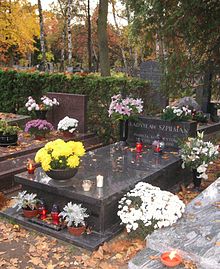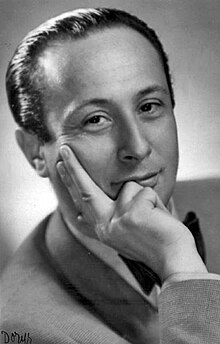Wladyslaw Szpilman



Władysław Szpilman (nickname "Władek") (born December 5, 1911 in Sosnowiec , Poland ; † July 6, 2000 in Warsaw , Poland) was a Polish pianist , composer , writer and, as a Jew, persecuted by National Socialism . He became known worldwide for his description of survival in the Warsaw Ghetto during the Second World War, The Pianist, My Wonderful Survival .
Life
Szpilman was born as the first son of the violinist Samuel Szpilman and his wife Edwarda. He had a brother Henryk and two sisters Regina and Halina. In the early 1930s Szpilman studied piano with Leonid Kreutzer and Artur Schnabel at the Berlin Academy of the Arts, and he studied composition with Franz Schreker . When the National Socialists came to power , he went back to Warsaw in 1933 and continued his studies at the Chopin Academy of Music with the well-known Chopin specialist Aleksander Michałowski . After completing his training as a composer and pianist, he played with the violinist Bronisław Gimpel . The Warsaw Piano Quintet emerged from this collaboration in the 1960s, and it continued into the 1980s. On April 1, 1935, Szpilman was hired as a pianist for the Polish Radio .
On September 23, 1939, Szpilman played a Chopin recital on Warsaw Radio, which became the last live broadcast because a few hours later a bomb destroyed the power station and the power went out.
From 1950, Szpilman was married to the doctor Halina Szpilman, nee Grzecznarowski.
Time of the Warsaw Ghetto
Szpilman was the only member of his family to survive in the Warsaw ghetto during the German occupation. His survival was made possible by the help of the Jewish and Polish resistance and in a special way by the German captain Wilm Hosenfeld . In the last winter of the war he discovered Szpilman half starved. But instead of shooting or denouncing him , he provided him with food and warm clothing. Szpilman survived while his parents and siblings were murdered in the Treblinka extermination camp .
It was not until 1951 that Szpilman found out the name of his helper and that he was a Soviet prisoner of war. He tried to save him, but Hosenfeld died on August 13, 1952 at the age of 57 in the Stalingrad POW camp .
New beginning after the war
With a Chopin concert, played again by Szpilman, the Polish Radio resumed its operations after the Second World War . Szpilman got a new job at the station and headed the music department until 1963.
In 1998 he was awarded the Commander's Cross with Star of the Order Polonia Restituta . Szpilman was married and the father of two sons. His younger son Andrzej Szpilman followed in his footsteps and also became a musician.
Musical work
Szpilman was chamber music partner of the highest-ranking violinists such as Henryk Szeryng , Roman Totenberg , Ida Haendel , Tadeusz Wroński and Bronisław Gimpel , with whom he founded the Warsaw Piano Quintet . Szpilman conducted the Warsaw Piano Quintet from its first concert in 1963 (“Wigmore Hall” in London) to the quintet's last concert in 1986 ( Hamburg Music Hall ). Szpilman performed as a concert pianist and chamber musician in Poland, throughout Europe and America. He was also able to build on his successes as a composer after the war. Szpilman's compositional oeuvre, which began in his Berlin years and which he did not give up during his time in the Warsaw ghetto, includes symphonic and concert works, piano music, but also numerous radio plays and film scores as well as around 500 songs and hits, many of which are still popular in Poland today - they earned him the attribute of "Cole Porter, Gershwin, McCartney of Poland". In 1961, Szpilman founded the international hit festival in Sopot, which is still held in summer today , similar to the Grand Prix Eurovision de la Chanson . But not only his hit compositions are played in Poland and elsewhere to this day. His classical works for piano and orchestra show great closeness to George Gershwin , who also managed to be successful beyond the boundaries of popular and serious music .
memoirs
In 1946 Szpilman published the book Śmierć miasta (German: Death of a City ) in Warsaw . In it, Szpilman tells his life as a Jew from 1939 to 1945, especially his survival in the Warsaw ghetto . After its first publication, the book was not published in communist Poland for political reasons.
In 1998, Szpilman's son Andrzej published an expanded version of his father's memoirs, initially in a German translation by Karin Wolff ( The Wonderful Survival ) in Ullstein Verlag . Translations into numerous other languages followed.
The film adaptation of the memoir by director Roman Polański ( The Pianist , 2002) received, among other things, the Palme d'Or at the Cannes Film Festival in 2002 and three Oscars .
Reputation damage
During the German occupation, Szpilman also appeared with the singer Wiera Gran , who after the Warsaw Ghetto uprising in 1943 collaborated with the Gestapo and is said to have handed Jews over to the Germans in the Aktion Hotel Polski in Warsaw. The description in a biography of Wiera Gran that Szpilman was involved in a violent action by the Jewish police in the ghetto in 1942 was prohibited in 2013 by an injunction from the Hamburg Higher Regional Court at the instigation of Szpilman's son . In Poland, the appeals court in Warsaw finally granted a corresponding character assassination suit on June 29, 2016. The author and publisher of the biography Wiera Grans have to apologize publicly and delete the relevant passages from future editions.
memoirs
- Karin Wolff (Ed.): Job 1943. A Requiem for the Warsaw Ghetto . Anthology, 1983. This was the first time extracts from Szpilman's memoirs appeared in German
- Władysław Szpilman: The Wonderful Survival - Warsaw Memories 1939-1945 . Translated by Karin Wolff. Foreword by Andrzej Szpilman, essay Wolf Biermann , appendix Wilm Hosenfeld . Econ, Düsseldorf 1998 ISBN 3-430-18987-X
- Władysław Szpilman: The pianist, My wonderful survival . Ullstein, Munich 2002 ISBN 3-548-36351-2
Adaptations
- The pianist , film from 2002
- Radio feature: The Szpilman from Warsaw by Waclaw Stawny, NDR / SR 2001, 54:07 minutes
Discography
- CD "F.Chopin - Collected Works" - National Edition - F.Chopin - Piano Trio and Introduction and Polonaise - W. Szpilman, T. Wronski, A. Ciechanski, Muza Warszawa 1958
- CD “J. Brahms - Piano Quintet “The Warsaw Piano Quintet, Muza Warszawa 1976
- CD "Wladyslaw Szpilman - A Musical Portrait" Works by Szpilman, Rachmaninov and Chopin, Alinamusic Hamburg 1998
- Władysław Szpilman - Portret [5 CD box set] Polskie Radio Warszawa 2000
- CD Wladyslaw Szpilman. The Original Recordings of the Pianist. SONY Classical 2002
- CD The Pianist [Soundtrack] SONY Classical 2002
- CD Songs of Wladyslaw Szpilman - sings Wendy Lands, Universal Music USA 2003
- CD Works For Piano & Orchestra SONY Classical 2004
- Władysław Szpilman - Legendary Recordings [3 CD Box-Set] SONY Classical 2005
Compositions
- Władysław Szpilman: Suite. The Life of the Machines for Piano (1933). Boosey & Hawkes Berlin / New York 2004 ISBN 3-7931-3077-0
- Władysław Szpilman: Concertino, piano and orchestra, piano reduction, Schott Mainz 2004 ISBN 3-7931-3086-X
- Władysław Szpilman: Concertino, piano and orchestra, score Schott Mainz 2004 ISBN 3-7931-3079-7
- My memories of you. 16 selected songs by The Pianist Władysław Szpilman Boosey & Hawkes Berlin / New York 2003 ISBN 3-7931-3085-1
Web links
- Works by and about Władysław Szpilman in the catalog of the German National Library
- Wladyslaw Szpilman in the Internet Movie Database (English)
- Compositional work for Boosey & Hawkes
- Websites on The Pianist (multilingual)
Individual evidence
- ^ Entry at LexM , Institute for Historical Musicology, University of Hamburg
- ^ Order of the Hamburg Higher Regional Court , May 22, 2013, facsimile on veragran.com, accessed on September 2, 2016
- ^ The family of famous ghetto pianist Szpilman wins character assassination trial in Poland . ( Memento of the original from August 2, 2016 in the Internet Archive ) Info: The archive link was inserted automatically and has not yet been checked. Please check the original and archive link according to the instructions and then remove this notice. Donaukurier , August 1, 2016
| personal data | |
|---|---|
| SURNAME | Szpilman, Wladyslaw |
| ALTERNATIVE NAMES | Szpilman, Władek |
| BRIEF DESCRIPTION | Polish pianist, composer and writer |
| DATE OF BIRTH | December 5, 1911 |
| PLACE OF BIRTH | Sosnowiec |
| DATE OF DEATH | July 6, 2000 |
| Place of death | Warsaw |

